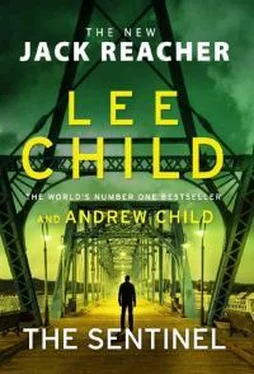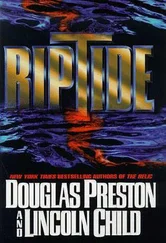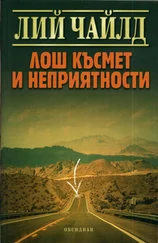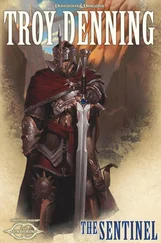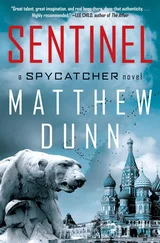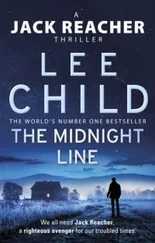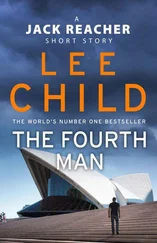The pair of police cars stopped at the side of the street and killed their sirens and light bars. Four officers jumped out. Three converged immediately on the sidewalk. One lingered to inspect the damage to his car. All had their guns drawn, but not raised. They expected their numbers to give them the advantage, Reacher guessed, but were taking no chances. Which seemed like a sensible attitude to take.
‘On the ground,’ the lead officer said. ‘Face down.’
‘You’re arresting us?’ Reacher said.
‘What were you expecting? A lollipop? Get on the ground.’
Reacher didn’t move.
The officer stepped closer. ‘On the ground. Do it now.’
Cops are the same the world over. Once they commit to a position in public they never back down. Trying to make them is a waste of time. Reacher knew that from personal experience. But still, there are standards to uphold.
‘All right,’ Reacher said. ‘I’ll let you arrest us. We’ll be released in five minutes, anyway. But we’re not getting on the ground.’
The team’s temporary base had been established the week before in a motel eight miles west of town. Traffic was light so theoretically the ground could be covered in twelve minutes without drawing unwelcome attention. But that afternoon the occupants of both vehicles took substantially longer to get back.
The guys from the Suburban made it first. It was easier for them since neither was injured. They started by heading ten miles north. The driver, who went by the name of Vasili, gave it an initial blast to get clear of the arriving police, then slowed to just above the limit until they reached a patch of waste ground behind a dense stand of trees. The place was secluded enough but they knew better than to torch the damaged vehicle. That would be the same as texting a map to the cops and saying Here’s the SUV you’re looking for . And if it could be salvaged the Suburban would still be a valuable asset, so they got to work. Vasili lined up on a concrete post at the end of a fence by the side of the road and slammed back into it. He pulled forward and repeated the manoeuvre then climbed out to check the damage. It was satisfactory, he decided. Deep enough to obscure the dent sustained when they clipped the police car but not so extensive as to give a different cop an excuse to pull them over. He drove around behind the trees and wiped down the interior while his partner, who used the name Anatole, swapped the plates. Then they switched to their secondary vehicle for the final thirteen-mile diagonal stretch.
Natasha was driving the Toyota. She started out going south for six miles. She took it very easy. She had an additional reason to drive slowly. She was worried about two of her companions. The guy Reacher had thrown through the window, Petya , had wound up with an injured shoulder. Natasha wasn’t sure if the damage had been done going in or wriggling out. He had kept quiet at the time but now his face was pale and he groaned every time they hit a bump or a pothole. Ilya , the guy Reacher hit, was still out cold. Natasha was concerned about concussion and didn’t want to cause any additional damage. She wanted both of them back in the game as soon as humanly possible. It was hard not to paint what had happened that afternoon as anything but a failure. With failure comes the danger of replacement. That danger grows if the team is left under strength. And that danger had to be avoided at all costs.
After fifteen minutes they pulled into a lot belonging to a chintzy roadside diner. Natasha switched plates while the other woman, Sonya , helped Petya into their secondary vehicle. Together the two women transferred the unconscious Ilya and sanitized the Toyota’s interior. Then they set out for the motel, looping further west than strictly necessary which stretched the final leg out to twelve miles.
Natasha had taken her time at each stage of the journey. Partly due to thorough training. Partly due to taking pride in doing the job right. But mainly due to how little she was looking forward to the next step in the process. The report. Making the call presented no major difficulty. There was no particular challenge in describing what had happened. She knew that her contact would listen without interruption. He’d save any questions he might have until she’d finished speaking. He’d hang up. And then there would be the wait. For the verdict. Continue. Or stand down. A fighting chance. Or disaster.
The information would flow up the chain of command until a decision was reached. Who that involved or where they were located, Natasha didn’t know. The system was designed that way. For security. Compartmentalization was king in the world she currently inhabited. She suspected there must be a local connection. Someone with their ear to the ground. Who raised the alarm in the first place. Who may or may not still be involved. Who may or may not have a say in the outcome. Identifying him or her would be possible, she supposed. Maybe necessary. Certainly desirable. But that was a problem for the future. Right then all she had to worry about was keeping her team, and therefore herself, in the field.
The lead officer took care of searching Reacher. He was thorough. And slow. Rutherford was in the back of the first car before the officer got as far as Reacher’s waist. He was reclaiming a little authority, Reacher guessed. Showing whose timetable they were working to. Reacher stood still and let him finish. Then the officer stepped to the side and made a call on his cell, while another cop guided Reacher into the back of the second car.
Reacher expected the station house to be outside the main part of town, some place where the real estate was cheaper, so he was surprised when the journey ended after two streets. The cop used his lights to blast through the intersection with the broken signals, took the next left, then swung left again into a lot at the side of a wide sandstone building. It was braced with Greek columns and studded with rows of parallel windows. The officer pulled up next to the car that had been hit by the Suburban and climbed out. A framed sign announced the place as the courthouse, and smaller letters underneath added that it was also home to the treasurer’s department, the town clerk, and the police department. All it was lacking for full efficiency was the jail.
The officer led the way past the porticoed entrance at the front of the building, which was apparently reserved for members of the public who hadn’t been arrested, and continued around to the side. He stopped at a plain metal door, ignored its card reader and unlocked it with a key, then ushered Reacher down a dimly lit flight of cement steps. They emerged at the side of a reception counter. It was glassed in all the way to the ceiling and had a full set of blinds, which were closed. On the opposite side brass handrails lined the stairs that respectable citizens could use on their way to file reports or make enquiries or conduct whatever other kind of legitimate business regular people have.
The officer pressed a buzzer and after a moment a door opened, leading to a booking area. Another cop was waiting at a large wooden table. Behind him there were two desks supporting worn but serviceable computers which were currently switched off, a stack of deep plastic trays in a rainbow of colours, and a pale, droopy potted plant. The walls were covered with posters warning against the dangers of crime and encouraging the public to take responsibility for their own safety. The cop grabbed one of the trays and dropped it on the table near where Reacher was standing.
‘Put your possessions in there.’ He sounded bored. ‘You’ll get them back when you’re released.’
Reacher produced his roll of cash. His toothbrush. His ATM card. And his passport.
Читать дальше
